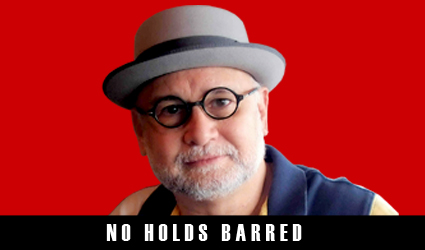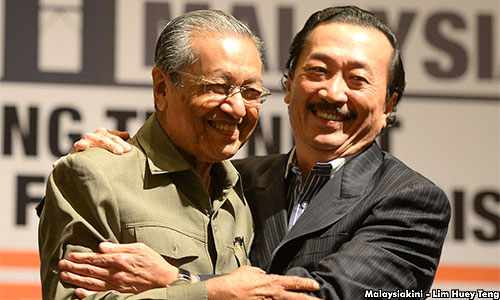I already declared back in 2002 I do NOT like Anwar

There are those who say I did a U-turn (against Pakatan) in 2015 when Dr Mahathir started attacking Najib Razak. Some say my U-turn started in 2011 during the Sarawak state election. Actually, I ‘turned’ against Anwar back in 1993 when he became Vincent Tan’s stooge or baruah. And in my interview in Australia in 2002 I mentioned I was against Anwar.
NO HOLDS BARRD
Raja Petra Kamarudin

The Director of the Special Branch, Abdul Hamid Bador, personally told me that Anwar Ibrahim is gay and that the police have 11 cases against him
**********************************************************************************
Royal revolutionary pays price for backing Anwar
(The Sydney Morning Herald, 30 March 2002) – He was held for 52 days in solitary confinement in a filthy windowless cell. When they brought him out for the daily interrogation sessions he was always blindfolded and handcuffed. For the first five days he refused food and water until he came close to physical collapse. Then the abuse and threats of the jailers were replaced with sweet talk and fast food.
In early April last year, Raja Petra Kamarudin was one of 10 opposition activists rounded up under Malaysia’s Internal Security Act and accused of plotting the violent overthrow of the government of Dr Mahathir Mohamad. A year later, no evidence has been produced to substantiate the sensational allegations, but most of the group remains in prison – detained without trial for two years by government order.
Raja Petra thinks he was freed because the authorities took seriously his veiled threats of another hunger strike. His death in custody would have posed more than the usual complications: his uncle was the king of Malaysia, Salahuddin Abdul Aziz Shah, the sultan of Selangor, who died last November.
Raja Petra does not quite fit Dr Mahathir’s description of a bomb-wielding revolutionary. A prince with a distinguished Malay pedigree and a Welsh mother, he was educated at the exclusive Malay College Kuala Kangsar – “the Eton of the East” – and was a successful businessman before embarking, in his late 40s, on a new career as an author and journalist.
Raja Petra’s real crime was to have taken up the cause of another Malay College old boy who offended Dr Mahathir – Anwar Ibrahim, the former deputy prime minister and once heir apparent to the Malaysian leadership who is serving a 15-year prison sentence after being convicted on discredited charges of sexual misconduct and abuse of power.

Anwar Ibrahim became Vincent Tan’s baruah in 1991 after he took over as the Finance Minister from Daim Zainuddin
Anwar’s real offence was to have challenged Dr Mahathir’s rule and mounting corruption within the Government. When Anwar was sacked from the cabinet, dumped by the ruling party, jailed on fabricated charges and bashed in custody by the then chief of police, Raja Petra sprang to his defence.
The prince became a leading member of Keadilan – the reform party led by Anwar’s wife, Dr Wan Azizah Wan Ismail – and headed the Free Anwar Campaign and its US-based Internet site. Inevitably, he, too, became a target for Dr Mahathir’s special branch.
This week, as the hearing of Anwar’s appeal against part of his sentence continued before the Federal Court in Kuala Lumpur, Raja Petra was there giving moral support to Anwar’s family and friends and chronicling proceedings for the Free Anwar Web site. It is an improbable brief for a man who for much of his life has had an ambivalent attitude towards the former school prefect turned politician.
“I didn’t like him, to tell you the truth,” Raja Petra says about their early relationship. “He was always a rabble rouser. That was back in the early ’60s and Malaysia had just gained its independence. We were brown-skinned Englishmen. I didn’t speak a word of Malay until I was in my 20s. But Anwar railed against all that. He attacked the British colonialists.”
While young Raja Petra was parroting the manners and mores of the British, Anwar was building his credentials as a political activist. He helped to found ABIM, the Muslim youth movement that championed human rights and social justice issues, a role that gave him a domestic political springboard and an international profile.
“It was not until the late ’70s that I got to rediscover Islam, became a born-again Muslim and cut out all my beer drinking,” Raja Petra says. “When I did my first Haj in 1981, I met a lot of people and everyone knew about Anwar Ibrahim and I was quite impressed.”
While wary of the ruling United Malays National Organisation and its leader, Raja Petra agreed to work on Anwar’s campaigns after he joined UMNO and ran for various executive posts in the 1980s.
As Anwar rose to become Dr Mahathir’s deputy and anointed successor, the two former college boys again drifted apart. And when Anwar was first sacked by Dr Mahathir in 1998, Raja Petra had little sympathy: “I thought it was his problem. He chose this partner, he got screwed and he would have to live with it.”
But as Dr Mahathir moved beyond the sacking and sought to destroy Anwar’s reputation with allegations he had been involved in a string of illicit homosexual and heterosexual affairs – and had abused his position to subvert police inquiries – that attitude quickly changed.
“Not only me, but many people who up to that point didn’t give a damn changed our minds. Sacking was one thing, but to see him beaten up and left for four days without medical help … that was really crossing the line.”
Raja Petra has paid dearly for standing up for Anwar. He has been abused and threatened by the authorities, and his home has been raided by police trying to shut down the Free Anwar Web site. His arrest last year – when he was dragged from his car in front of his wife and children in a crowded street – was an experience almost as humiliating as his detention. But it is a price he is willing to pay.
He remains hopeful that the current appeal will see justice done at last and Anwar freed. Either way, he believes Anwar will eventually return to political prominence.
As for himself, Raja Petra sees the struggle for democracy in Malaysia as a chance to rebuild the credibility of royalty in the eyes of many disillusioned Malays. “Perhaps I can show that the royal families are not a total bunch of useless leeches.”


